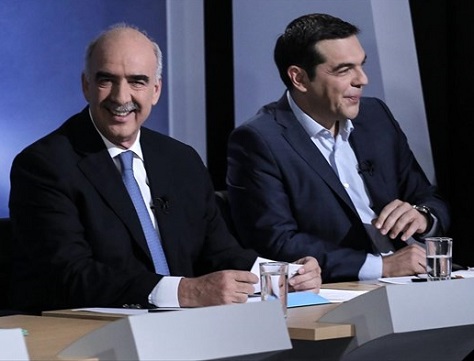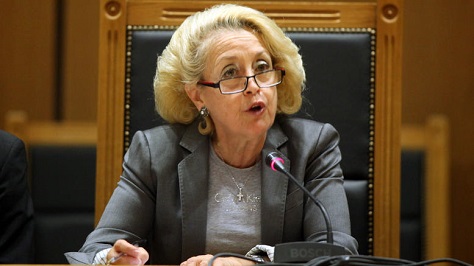 Photo credit to International Balkan News Agency.
Photo credit to International Balkan News Agency.
In the televised debate earlier this week, Greece’s recent prime minister Alexis Tsipras dismissed the idea of a grand coalition as ‘unnatural,’ arguing that Greek voters would have to choose between a progressive coalition or a conservative coalition.![]()
Tsipras, however, is wrong.
Greek voters aren’t choosing much of anything at all. Greece is essentially now a fiscal ward of the eurozone’s finance ministers, and the next Greek parliament’s composition will not be much different than the current one, a mix of left-wing and right-wing legislators who committed to implementing the EU-mandated bailout program, despite their misgivings, because the alternative would be much worse.
Whether the recent prime minister Alexis Tsipras, leader of SYRIZA (Συνασπισμός Ριζοσπαστικής Αριστεράς, the Coalition of the Radical Left), or the opposition leader Vangelis Meimarakis (pictured above, left, with Tsipras), head of conservative New Democracy (ND, Νέα Δημοκρατία) leads that effort doesn’t actually matter all that much.
In substance, it’s the choice between orange-flavored sorbet or tangerine-flavored sorbet.
Neither leader will truly be in charge of Greece’s fiscal policy, because that is already being set by eurozone finance ministers in Brussels and Berlin. The best that the next prime minister can hope for is some form of debt relief — eurozone leaders will discuss the matter in October, and economists believe that some form of debt relief (even if that just means extending Greece’s repayment period) will be necessary, despite strident political opposition in countries like Germany, Finland and The Netherlands.
* * * * *
RELATED: Greece to vote in September snap elections
* * * * *
The election is now a dead heat — polls show that the Tsipras-led rump of SYRIZA is essentially tied with New Democracy. Though the 300-member Hellenic Parliament is generally determined by proportional representation, the winner of Sunday’s election gains a ‘bonus’ of 50 seats, so even a narrow win means a windfall for the first-placed party.
But the question is chiefly one of style and symbolism — and which leader the electorate believes can lead Greece through the bailout in the most efficient and painless manner in light of the constraints any government will face in charting its own fiscal policy course.
Many Greeks believe Tsipras really did do his best to get a better deal for them, but they also realize that the past eight months of brinksmanship destroyed Greece’s nascent and fragile economic recovery, accelerated the level of capital flight and nearly forced a catastrophic economic and humanitarian crisis. Despite his youthful charisma and the rupture that he represents from Greece’s corrupt elite, Tsipras has zigged and zagged so much that it’s hard to know what to expect from him in the future.
Meimarakis, for his part, really does represent everything about the old guard that dominated Greek politics since (and even before) the end of military rule in 1974. Moderate and modifying as he may seem, a return to New Democracy would represent a capitulation on the part of the Greek electorate that the SYRIZA experiment has been an abject failure.
When Greek voters cast their parliamentary ballots on Sunday, it will be for the fourth time since May 2012. Each government that voters have elected since 2009 has eventually crumbled under European pressure to uphold the terms of bailout agreements that have forced spending cuts, tax increases and varying levels of reform packages on the country, in exchange for the financing that Greece needs to prevent insolvency and, in effect, its exit from the eurozone.
Assessing the SYRIZA experiment
That turned out to be no less true for SYRIZA after it won a relative landslide in January. Tspiras came to office promising to extract more concessions from Greece’s European lenders while keeping Greece in the eurozone. He and his now-infamous former finance minister, Yanis Varoufakis, miscalculated their amount of leverage. In 2012, perhaps, a SYRIZA government could play hardball with the prospect of ‘Grexit’ to reduce the austerity burden that the European Commission and the International Monetary Fund were requiring as a condition to bailout funds. But by 2015, with no real European fear of generalized contagion from a Greek flameout, Tsipras really had no other cards to play, short of some wild-eyed plan to achieve a bailout from Russia. Furthermore, many European leaders believe that Grexit would actually strengthen the eurozone by kicking out its weakest member.
When Tsipras called an 11th hour referendum in July on the terms of extending Greece’s second bailout, he won an impressive victory to reject those terms. But a week’s worth of capital controls, ATM restrictions and a technical default to the IMF made it clear that a messy and destabilizing eurozone exit would be the only alternative for Greece. So Tsipras fired Varoufakis and, after nearly 20 hours of tense negotiations, entered into talks for a third, €86 billion bailout, which will require even more stringent reforms and austerity measures.
It was eminently predictable that Tsipras’s decision would split SYRIZA and, sure enough, former energy minister Panagiotis Lafazanis and 24 former SYRIZA MPs broke away to form Popular Unity (LE, Λαϊκή Ενότητα), a far-left group that favors Greece’s complete exit from the eurozone. It counts among its supporters Manolis Glezos, a 93-year-old hero of Greece’s World War II resistance. The rupture, however, does not fully describe just how fractured SYRIZA has become. Parliamentary speaker Zoe Konstantopoulou hasn’t formally joined Popular Unity, but she has denounced Tsipras in harsh terms. Varoufakis isn’t running for reelection at all, and he seems set to return to academia while reveling in his role as the quasi-Marxist James Dean of finance ministers.
The new normalcy looks a lot like the old normalcy
Meimarakis has only served as the party’s interim leader since July, when former prime minister Antonis Samaras stepped down, but he has done remarkably well in the role. Though he represents the old political elite (his father served as a member of the Hellenic Parliament), Meimarakis has dragged New Democracy to the center and has repeatedly insisted, despite Tsipras’s denunciations, that he will work valiantly to form a grand coalition with SYRIZA if New Democracy wins on September 20.
Tsipras has ruled out any coalition with New Democracy or the center-left PASOK (
With the far-right, neo-fascist Golden Dawn (Χρυσή Αυγή) polling in third place, and with Popular Unity and Greece’s Communist Party (KKE, Κομμουνιστικό Κόμμα Ελλάδας) unwilling to join Tsipras to implement the third bailout program, and with Tsipras’s sole ally, the right-wing nationalist Independent Greeks (ANEL, Ανεξάρτητοι Έλληνες) in danger of falling short of the 3% threshold to win seats in the Hellenic Parliament, there’s no other way for Tsipras to form a majority government. Even when Tsipras and SYRIZA won a convincing victory with a margin of nearly 10% in January’s elections, it won just 149 seats — requiring Tsipras to join forces with ANEL.
It’s almost as if Tsipras called the election hoping that the electorate would vote him out of power so he could avoid taking the politically difficult step of leading a grand coalition. (Or, even more cynically, winning a fresh mandate before the economic pain of the third bailout program sets in — for example, VAT hikes will go into effect on certain tourism services in many Greek islands at the beginning of October.
Greek voters, since before the sovereign debt crisis and their economic depression began, have consistently voted for parties and politicians who oppose Greece’s exit from the eurozone. Polls for the current election bear that out — they’re not turning en masse to Golden Dawn, the SYRIZA rebels or the Communists.
All of which speaks to the futility of the election. A month after calling snap elections, Tsipras will either return to the comfortable opposition or face the same coalition mathematics that he has faced since agreeing to Greece’s third bailout in July.
One face-saving possibility (and hardly the worst solution, unlikely as it may be) is to hold over the 65-year-old interim prime minister Vassiliki Thanou (pictured above), the caretaker who has led the government since Tsipras resigned late last month to call fresh elections. The well-respected president of Greece’s supreme court and the country’s first female prime minister has guided Greece through the worst days of the European refugee crisis. After so much economic pain and political posturing, Greece could do far worse.
